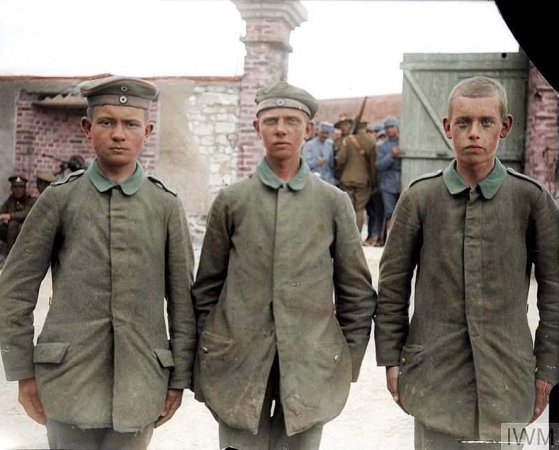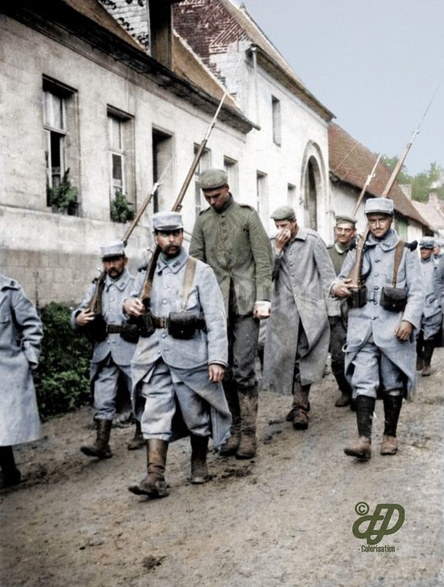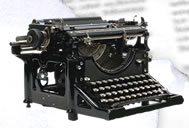This small notice appeared in
The Stars & Stripes at the very end of the war and described how German Prisoners of War, while in the care of the American Army, would be clothed.
After the Armistice a minority of German prisoners would remain in U.S. hands to dig the graves of American soldiers and Marines.


A brief notice reporting on the number of American Soldiers captured during the First World War. Also listed are the number of Americans who died in captivity as well as the number of prisoners taken categorized by branch of service. Interestingly, the notice states that 281 American Civilians were also taken prisoner.
Interestingly, the notice states that 116 American Civilians were also taken prisoner and we can assume that these Americans were with the Salvation Army, the Jewish Wellfare Board, the Knights of Columbus, etc.
Click here to learn what the Germans thought of American P.O.W.s...
This W.W. I letter was written by a French infantryman who had participated in one the earliest battles of 1914. In this letter, that managed to make it into the French, British and American papers, the Frenchman took a good deal of time to describe his impressions of the first German prisoners to be taken in the war:
"Their appetite is so great that, though in [the] presence of a French officer they will click their heels together properly, they never cease at the same time to munch noisily and to fill out their hollow cheeks."
This two page article is about P.O.W.s and the plays and concerts that they launched while in captivity; it is illustrated by numerous images of the prisoner/performers in costume.
If you are looking for an article that spells out how much more educated people used to be as compared to now, you might have found it.
Click here to read about the W.W. II Canadian POWs who collaborated with the Nazis.
Click here to read about American POWs during the Vietnam War.
A color photograph from the earlier part of the war, remarkable for it's clarity and mood. It depicts ten German prisoners wearing their 1910 tunics, staring in a dazed stupor at eight truly bored Poilus struggling through their potato pealing detail.
Attached is a
book review of what was described as the first book of it's kind: a compilation of assorted recollections by Imperial German officers of their years spent in captivity at the officer's prisoner of war camp at Skipton in Yorkshire.
Click here to learn how U.S. Army intelligence interrogated German POWs.
This piece reminds me of what my son's history teacher so wisely passed on to them one day in sixth grade: "History can be found anywhere". How right she was, and in this case, a seldom remembered but perhaps widely practiced method of escorting German prisoners to the rear was rendered by a cartoonist in a 1921 magazine advertisement for a firm that manufactured men's accessories [underwear]:
"Remember that big attack? You couldn't spare a whole squad to escort your prisoners back to the cages; you needed every man in front. You got around the difficulty by cutting off the Boches' trousers. That made them helpless. They couldn't run and they couldn't fight. You parked the skipper's dog robber on their flank with a warped rifle and ran'em back."
Click here to read an article about the American POW experience during the Korean War.
Immediately after the war General Pershing put the boys in the Army Intelligence Section to work compiling hundreds of pages worth of information concerning what the German Army thought of their American counterparts. It was concluded that, by enlarge, the Germans were afraid of the Doughboys - seeing them as recklessly brave, and unpredictably aggressive - provided with all the food they could want and kitted out with sensible and efficient equipment, the Germans begrudgingly learned not to underestimate their pugnacious enemies from across the sea.
However, the Germans learned just as quickly not to overestimate the American soldier when he was a prisoner of war: the Doughboys were believed to have been defiant, ill-mannered, cheeky and when required to work or salute German officers they would simply refuse.
The report was declassified in 1990.
Click here to read an article about the sexually-transmitted diseases among the American Army of W.W. I...
Here is a brief notice that appeared in a small, semi-monthly magazine concerning a PoW exchange that took place between the Soviets and the Germans some three years after the Russian Army made their uneasy peace with Imperial Germany.
Click here to read an article about the American POW experience during the Korean War.
A former American prisoner of war recalled the American flag that he and his fellow prisoners had fashioned from Bull Durham and Lucky Strike bags the day they heard that the Germans had quit.
